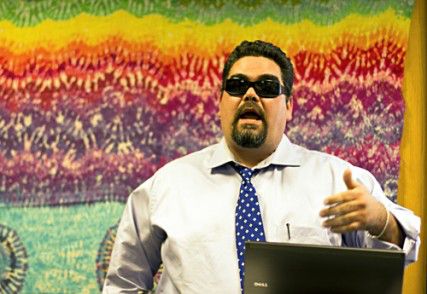Rick Doblin, founder of the Multidisciplinary Association for Psychedelics Studies, said the government and the National Institute on Drug Abuse has a “monopoly on marijuana research” at Suffolk University NORML’s 2012 Cannabis Curriculum and Hemposium on Tuesday.
“The only place in the country that has NIDA approval to grow marijuana for research is a government-run facility at the University of Mississippi,” he said. “We have been in court for six years trying to get clearance.”

About 65 students and speakers gathered at Suffolk University for a forum that encouraged students to do research and projects on cannabis and its prohibition, in addition to providing a place for students to showcase their results.
“It’s about getting people together,” said John Dvorak, a hempologist. “I’m preaching to the preachers.”
Guest speakers from institutions such as Boston University and Tufts University spoke at the Hemposium, in addition to student activists, political advocates and researchers.
The speakers discussed the medical usage of marijuana, the political and economic benefits of legalization of marijuana and the methods of activism and securing research.
“Cannabis has been used by people for thousands of years for spiritual and shamanistic rituals,” said BU College of Arts and Sciences junior KC Mackey, president of BU’s Students for Sensible Drug Policy.
Speakers said they were anxious about the government’s refusal to give research access to private institutions and distribute marijuana that can be researched.
“Cannabis can help a multitude of medical problems, cancer, multiple sclerosis – almost anything you can think of,” said Tufts junior Matthew Kennedy while he presented his paper on Cannabis at the forum.
Many advocates made pitches to advocate the legalization of medical and non-medical marijuana.
“When California passed its law in [1995 through 1996], for example, it was very, very wide open,” said Erik Wunderlich, a medical marijuana policy advocate. “It wasn’t particularly well regulated and it caused a lot of problems because of the vagaries of the law. The lack of coherence has really caused a lot of problems both for the patients, the providers, the dispensaries and law enforcement.”
There have been problems with previous medical marijuana laws in Montana, Washington and California that have caused issues for movements in other states, Wunderlich said.
“There will [be a] public ballot initiative for legalization of medical marijuana in both the Somerville and Cambridge districts,” said Alex Arsenault, of the Massachusetts Cannabis Reform Coalition.
Students attending the symposium said it increased their desire to initiate activism within their community to try and further the cause of marijuana reform.
“I think it definitely gives me better insight on how I can participate . . . [and] how I can be active,” said Lesley University junior Karl Daruwala. “Before . . . it was just hearing things on the news or seeing things on the Internet.”
The Hemposium also discussed alternative uses for hemp, such as an alternative to milk, biofuels, concrete and shingles.
“It opened up my eyes to a lot of things I didn’t know about hemp and marijuana . . . It’s amazing how much you can do with this plant, and it is only a plant, and the fact that it’s illegal is ridiculous,” said Suffolk University freshman Sophie Purton.
The Hemposium’s purpose was to set out and educate people about marijuana and the benefits it can have on society, Dvorak said.
“It’s just the perception by society that makes it a stigma,” said Tufts sophomore Allison Wilens, “and to have a stigma influences how it affects you.”





















































































































